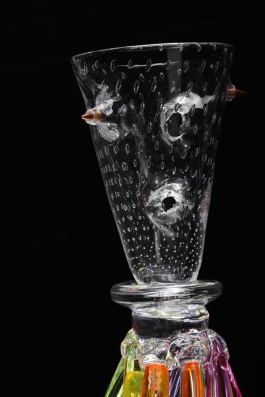
The exhibition showcases vases by Bořek Šípek for the seven executed
 |
Šípek aims to return glass vases inspired by the fates of several executed figures from near or distant history to the world. Seven pieces were made from each of the seven vases, with proceeds from their sale going to Art for Amnesty, an organization under Amnesty International. The exhibition also features photographs of model Jana Doležalová dressed as each of the executed characters. The display is complemented by Sís's drawings and Všelich's texts.
"In an effort to fill at least a few empty spaces left by these people. In an effort to highlight that those empty spaces are always filled with an unnatural, possibly fatal chill. And the vases might convey one more important thing. Oh yes, they were beautiful and radiant people, those who inspired the creation of this collection with its grim name, those who were sentenced to death," the project's authors state.
Years ago, thoughts about the death penalty prompted Šípek to create the vases, which are still applied not only in totalitarian regimes but also in some countries in the USA at the beginning of the 21st century. He was reportedly interested in what happens to people condemned to death.
The series of seven executed individuals begins with the Greek philosopher Socrates - according to Šípek, he was the one who "corrupted the youth through thinking." The others include English Queen Anne Boleyn, the second wife of Henry VIII and a significant figure in the English Reformation who "too much believed in love," Jan Jessenius, "a scientist in unscientific times" and a physician who performed the first public dissection in the Czech lands.
The first Chinese feminist of modern times, Qiu Jin, protested primarily against the custom of binding girls' feet at the beginning of the 20th century. This year, Šípek accompanied his vases with the awarding of human rights prizes presented by Amnesty International in May in Berlin. The first laureate was Chinese artist and regime opponent Ai Weiwei, who was to receive a vase for Qiu Jin. At that time, however, he had his passport confiscated, which he only received back this July after four years.
American singer-songwriter Joan Baez received a vase dedicated to the Italian anarchists Sacco and Vanzetti, whom even dozens of testimonies could not save from the electric chair and about whom Baez sings in the song "Here's To You." The seventh hero of Šípek is Solomon Mahlangu, an anti-apartheid fighter, "a boy who wanted to have the same rights as his judges and his executioner."
The English translation is powered by AI tool. Switch to Czech to view the original text source.
0 comments
add comment






